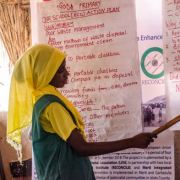
Educators and trainers are powerful agents of change in helping to remake the education sector to address sustainability and enhance the role of education and learning in sustainable development projects and initiatives. Teachers can be a tremendous force brought to the task, as teachers worldwide number around 70 million, and the corps of trainers and informal educators is virtually countless. But for educators and trainers to help usher in the transition to a sustainable society, they themselves must first become confident in practicing ESD (UNESCO, 2014). They must be empowered to facilitate confidently and effectively students, trainees and other learners to acquire the knowledge, skills, attitudes and values to contribute to sustainable development. They themselves need to acquire knowledge about, commitment to, and motivation for sustainable development.
As the world prepares to mark the World Teachers Day ( WTD) on October 5th, it is important to stress the importance empowering teachers to be agents of sustainable development. World Teachers’ Day commemorates the anniversary of the adoption of the 1966 ILO/UNESCO Recommendation concerning the Status of Teachers. This Recommendation sets benchmarks regarding the rights and responsibilities of teachers and standards for their initial preparation and further education, recruitment, employment, and teaching and learning conditions. The World Teachers Day aims to focus on appreciating, assessing and improving the educators of the world and to provide an opportunity to consider issues related to teachers and teaching (UNESCO, 2019).
With the adoption of the Sustainable Development Goal 4 on education, and the dedicated target (SDG 4.c) recognizing teachers as key to the achievement of the Education 2030 agenda, WTD has become the occasion to mark progress and reflect on ways to counter the remaining challenges for the promotion of the teaching profession. World Teachers’ Day is co-convened in partnership with UNICEF, UNDP, the International Labour Organization, and Education International.
This year, the World Teachers’ Day will celebrate teachers with the theme, “Young Teachers: The future of the Profession.” The day provides the occasion to celebrate the teaching profession worldwide, to take stock of achievements, and to address some of the issues central for attracting and keeping the brightest minds and young talents in the profession.
Eco-schools Kenya has teacher training as one of its core strategies to enhance sustainability in schools and communities. As one of the steps of the Eco-schools process, over 15,000 teachers have gone through an extensive training course since 2003 to act as Eco-Schools ambassadors. The teachers encourage other schools to effectively address local environmental problems through action based learning following the principles of Eco-Schools.
In close cooperation with teachers and key governmental institutions the Eco-Schools project has developed wide range of environmental education materials for teachers and learners that comply with Kenyan curriculum requirements to treat environment as a cross curricula issue. The new Kenyan Competency-based Curriculum being rolled out by the Kenya Institute of Curriculum Development places great emphasis on environmental education as a pertinent and emerging issue. Eco-schools Kenya has developed environmental theme-packs for primary and secondary schools and made available to schools. The theme-packs cover the following issues; water, waste, energy, health, biodiversity and agriculture. Other resource materials developed include: Eco-Schools Handbook Starter Pack (information manual on the Eco-schools programme in Kenya), Teachers’ Environmental Education Guides for primary and Secondary schools, Training Module on Environmental Education and Eco-Schools Documentary video. A Faith-based ESD Toolkit has also been developed to enhance the faith-based value system and positive behaviour in the school and community to promote sustainable development using the eco-school strategy. It also demonstrates how faith-based values can be integrated into Education for Sustainable Development (ESD) in the primary school curriculum. Similarly, a teacher’s guidebook has been developed to help transform schools into models of sustainability for communities by instilling in learners a greening culture through mentoring and engaging them in hands-on green entrepreneurship initiatives for sustainability. The guide aims at enhancing the ability of teachers to mainstream green growth in the curriculum. All these materials have acted as tools and resources through which schools use to address sustainability challenges facing them. The materials have been widely acknowledged by relevant authorities in the Kenyan educational sector.
Bibliography
UNESCO. (2014). Roadmap for Implementing the Global Action Programme on Education for Sustainable Development. Paris, France: UNESCO.
UNESCO. (2019, September 27). World Teachers’ Day. Retrieved September 27, 2019, from UNESCO: https://en.unesco.org/commemorations/worldteachersday


 Alvin Henry
Alvin Henry
Muchas gracias. ?Como puedo iniciar sesion?